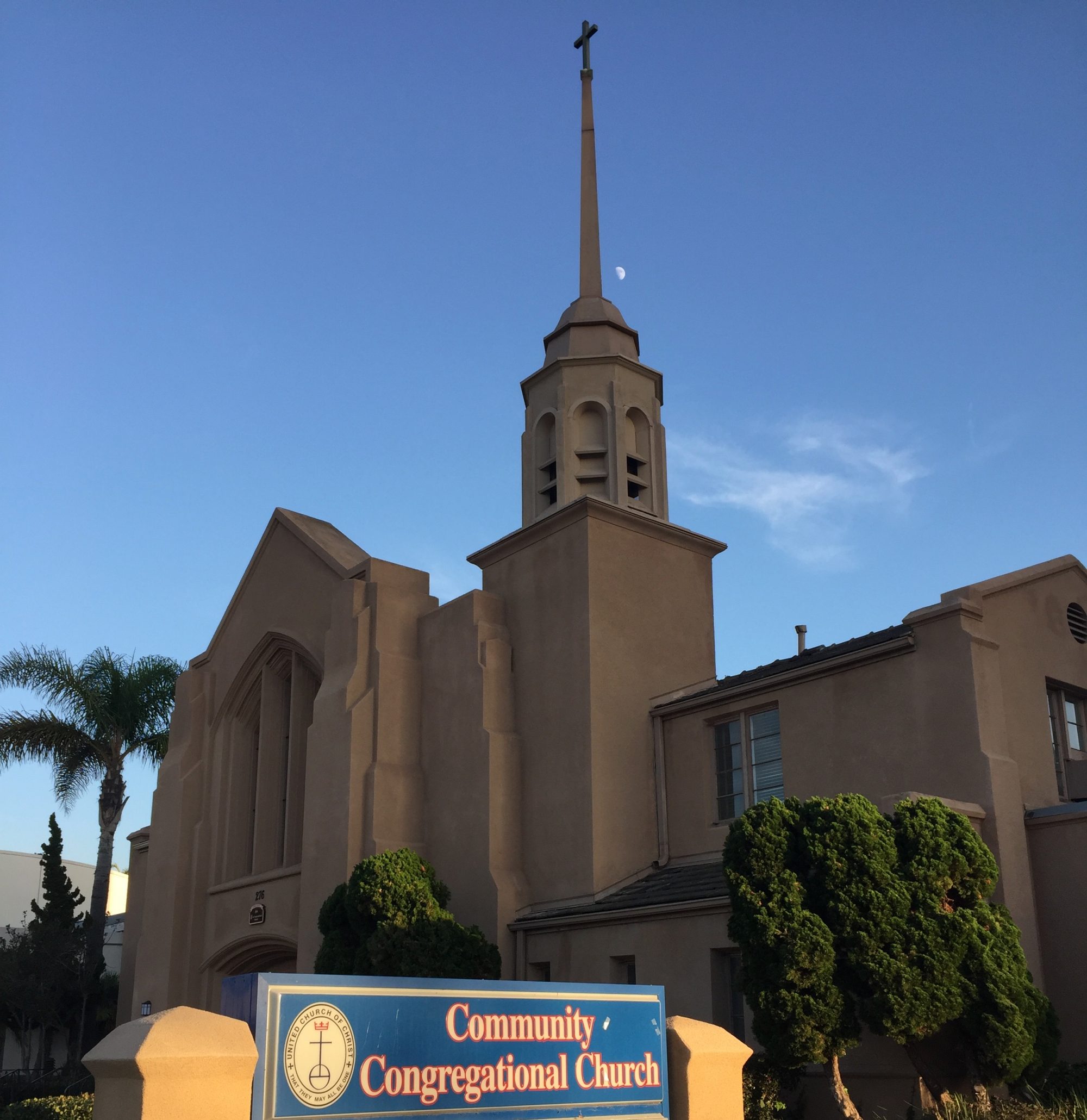“Waiting in Silence”
A meditation based on Isaiah 40:1-11
and Psalm 62:1-2
December 10, 2017
Community Congregational Church of Chula Vista
Dr. Sharon R. Graff
* * * * *
There is a rumor floating around the Christian world that silence is really only for monks and nuns and other reclusive religious types who like to hole up in monasteries or live their lives far apart from others. I used to think that, too! Silence could never be for active busy me, I thought…but no longer! Twelve years of practicing sacred silence have taught me that silence is a treasure holding incredible gifts—gifts that are accessible to each of us, gifts as unique and personalized as we are as humans. Now, I’m not talking about the sort of silence where the phone just doesn’t ring for an hour or where you have a few blissful minutes of receiving no text messages or a day without visitors or appointments. No, this silence of which we speak today is the sort of intentional silence that the psalmist describes. Hear and see those words again: [on screen…]
For God alone my soul waits in silence,
for my hope is from God.
God alone is my rock and my salvation,
my fortress; I shall not be shaken.
In these couple of verses, the psalm writer confesses to practicing a type of sacred silence—time carved out from the regular routine, perhaps in a special location, or at the least with a special attitude and approach to the silence. For the psalmist, intention and focus seem everything. “For God alone” the psalm begins…not for others, not for profit, not for direction, not for even family…but “for God alone my soul waits in silence.” The next line is equally as focused: “for my hope is from God”…the psalmist isn’t waiting for, or expecting, hope from any other source; rather, in the silence, the psalmist hooks up directly to the Source of all life and love. And in that connection—that sacred connection which comes from intentional and sacred silence—the psalmist is able to experience God as that rock, as that saving force, as that protective place wherein there is the affirmation, “I shall not be shaken…”
To ask rhetorically, who of us doesn’t want that sort of foundation and calm in this chaotic and busy world??!! But what does such a practice of sacred silence look like, and how does one begin? Here are some suggestions…
First: arrange ahead of time to be alone, without family, without schedule, without commitments for whatever time you’ve allotted for this sacred silence. It may be a few minutes in a private room in your home. It may be an hour before bedtime or in the morning. It may be a carved-out bit during your lunch hour at work, in a place where no one will interrupt you. It may be a weekend or whole week or more at a retreat center. The length of time is not as important at the beginning of your practice, as is your commitment to plan that space and time carefully.
Second: turn off your phone…no, not just turn it to vibrate or airplane mode. Turn. It. OFF! Swipe right or left or push that button that deactivates that little device. If you have a landline, turn the ringer to “off” and, for those of you, like John and me, with an old-fashioned answering machine, turn the volume off so you cannot hear incoming messages. I know this is asking a lot in our world of instant communication, yet this is an important step in claiming your right to silence.
Third: enter your silence with intention. Here’s a ritual others have found helpful. You might want to stand or sit in a favorite spot in your home and say these words out loud: “Christ in front of me, Christ behind me, Christ to the right of me, Christ to the left of me, Christ above me, Christ below me, Christ beside me, Christ within me…Christ, I welcome you to this silence and ask for your guidance.” And there’s your doorway into silence. After that last word, no more spoken words until your sacred silence is over.
During your silence, you may wish to read a verse of scripture, or take a walk, or gaze at a work of art, or write in a journal, or listen to a piece of music, or simply sit and look out the window. I’ve found that, in silence, whatever activity I choose offers me gifts, because I bring into it an expectation and a focused attention that clarifies all I see and do in that silence. I want to warn you, silence is not always pleasant…in fact, often when we give ourselves the gift of sacred silence—be it for a few minutes, a few hours, or a few days—the silence can turn cloudy and lead us into some difficult places of mind and heart and soul—places we normally and judiciously avoid with our busy schedules and packed routines. In silence, it’s as if a space opens up inside us, and that part of us that wants to grow jumps into it, and so, even those clouds (those difficult thoughts or challenging memories) can be gifts if we follow them, in the silence, with prayerful intention.
Finally, when you are ready to leave silence and re-enter the rest of your life, I suggest you take another moment to intentionally pass that doorway again. Maybe you restate the same thing you said to enter silence: “Christ in front of me and behind me, Christ to the right of me and to the left of me, Christ above me and below me, Christ beside me and within me…Christ, I thank you for being with me in this silence. Amen!” And then you resume your normal life’s work and activity.
Sometimes, when I’m teaching about sacred silence, I’ve heard the question from people who live alone, “why do I need to practice silence? My whole life is silent!” Alone time is not the same as sacred silence. The difference is in your intention. In sacred silence, your intention is to connect or reconnect with the Divine…to be open-hearted and open-minded to experience God’s presence with you…to even set an intention to work on a particular question or concern… and sacred silence is about setting time and space for those things to occur. Here’s an example, timely for this congregation: those of us not on the Search Team, might want to help them out by practicing some sacred silence for a few minutes each week, with the intention of finding the best possible minister to lead this congregation into your bright future.
You can see, I hope, intention is much the same as prayer. The kind of prayer we see in Jesus so many times. In particularly busy or complicated situations, Jesus carved out time and space away from others for very specific praying. This is sacred silence…and it is nothing like simple alone time!
A practice of silence—even and especially while we wait—adds such depth and meaning to our lives, it can grow our prayer life and deepen our spiritual connection to God and others and it can increase our compassion, our ability to forgive, our understanding of others—and it actually makes the waiting time we experience calmer, steadier, more hopeful. Just like the psalmist promised!
We are in a season of waiting, not just for a new pastor…but we are in this Advent time while we wait again to honor the birth of Jesus, the gift of light and enlightenment. The scriptures we read during this season of waiting include the passage we heard this morning from the Prophet Isaiah. Now neither of the words “waiting” or “silence” appears in this passage, yet there is a driving sense in it that the author is talking about the wait. For he describes what is yet to be in the distant future where every valley shall be lifted up and every mountain and hill shall be made low and the uneven ground shall become level and the rough places a plain. You know he’s talking metaphor here…and we could use some of that calming, yes?! And yet we wait. Isaiah says that, for now, while we wait, the need is for speaking tenderly. The need is for careful preparation. The need is for noticing where God is present and declaring it out loud. The need is for anticipating and expecting that God will feed you like a shepherd feeds the flock; and protect you like a shepherd gathers the sheep; and love you, deeply, intentionally, personally, just like a shepherd carries the sheep close to heart and leads the mother sheep gently home again.
Silence, my sisters and brothers, is about carving out some time and setting aside a space, so that, while we wait, we also return home regularly to the very heart of God.
* Amen and Blessed Be *

